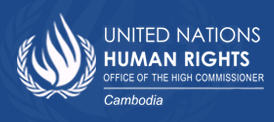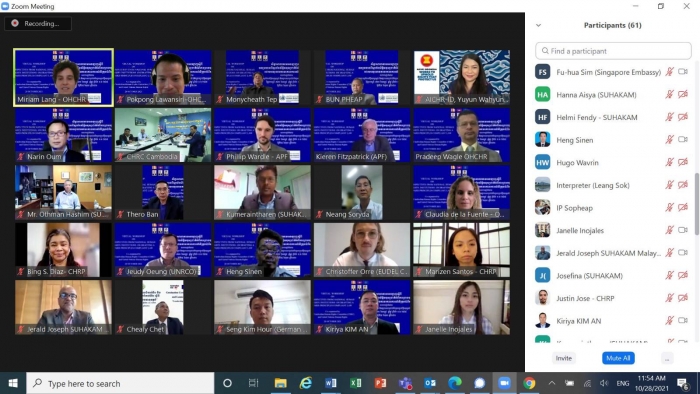

It has been more than 20 years in the making, but the Cambodian government is another step closer to creating a dedicated national human rights body.
A virtual workshop with members of the Cambodian Human Rights Committee (CHRC) today brought together a range of experts from across the region to share their experiences on establishing independent National Human Rights insitutions (NHRIs), including from Malaysia, the Philippines, and the region.
During his opening address the CHRC president Keo Remy reflected on the progress made on human rights in Cambodia, particularly on the draft law to establish a NHRI in Cambodia, which currently contains eight chapters and 32 articles.
“I’m greatly honoured to be part of this process…to meet each other online and share perspectives, to continue to improve and develop this draft law, serving for the benefit of human rights,” he said.
He also noted the CHRC had set up an online platform for members of the public to comment on the draft law and was undergoing consultation with NGOs, political parties and legislative bodies on the law.
Malaysia’s Human Rights Commissioner, Jerald Joseph, advised the CHRC that those appointed to serve as commissioners in a national human rights institution must not only be advocates for human rights, they must also proactively defend human rights. Reflecting on his country’s 20-year NHRI history he observed:
“You will have to be ambassadors of human rights, but you will also have to be defenders of human rights, and this is a very important dual role, especially if the might of the government is very strong.”
Commissioner Karen Gomez-Dumpit, from the Philippines’ Commission on Human Rights, pictured the commission as a bridge between civil society and government to bring attention to human rights issues of concern.
“It’s not really coercive but it also taps into moral persuasion [and] non-adversarial methods. If I were to picture a NHRI…it would be a bridge that leads from civil society to the government and vice versa’,” she said.
UN Resident Coordinator in Cambodia Pauline Tamesis said she was pleased to see revitalised efforts to establish Cambodia’s own NHRI after the last attempt stalled in 2006, as human rights principles were interlinked with Cambodia’s path to meeting the 2030 sustainable development goals (SDGs).
“An independent National Human Rights Institution can play [an important role] in the promotion and protection of human rights for all Cambodians, and human rights [is central] to sustainable development of Cambodia.”
United Nations High Commissioner for Human Rights Cambodia Representative Pradeep Wagle emphasised the importance of establishing a truly independent NHRI to protect human rights and freedoms, promote the rule of law, and prevent human rights violations and abuses:
“It is important to ensure an inclusive and participatory process and outreach to as many stakeholders as possible, to ensure that the draft law incorporates the diversity of views including those coming of civil society organizations. OHCHR will continue to work with the CHRC, UN and regional and national organizations to achieve these objectives,” he said.
The establishment of a NHRI has been repeatedly recommended by member states in Cambodia’s Universal Period Review at the Human Rights Council, as well as by treaty bodies reviewing Cambodia’s compliance with the human rights treaties to which it is a party.
The session ended with an informal agreement for Cambodian Human Rights Committee members to continue exchanging lessons learned and best practice of NHRIs from within the region, as it works to finalise the draft law. UN Human Rights Cambodia offered to facilitate further knowledge exchange for this purpose. It is hoped that the momentum gained from this workshop and the continued efforts by the CHRC will lead to the successful establishment of a national human rights insitutions for Cambodia in the near future.